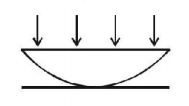Question
A thin slice is cut out of a glass cylinder along a plane parallel to its axis. The slice is placed on a flat glass plate as shown in Figure. The observed interference fringes from this combination shall be
A thin slice is cut out of a glass cylinder along a plane parallel to its axis. The slice is placed on a flat glass plate as shown in Figure. The observed interference fringes from this combination shall be

A.
straight
B.
circular
C.
equally spaced
D.
having fringe spacing which increases as we go outwards
Answer :
straight
Solution :
Locus of equal path difference are lines running parallel to axis of the cylinder. Hence straight fringes will be observed.
Locus of equal path difference are lines running parallel to axis of the cylinder. Hence straight fringes will be observed.